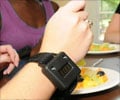New research reveals that the optimal number of bites a day for weight loss and good health is 100 bites a day. Read about the ‘Bite Monitor’ and find out more!

In this never-ending saga of weight loss, a number of researchers are developing too ls that count how much or how fast we eat. Researchers at South Carolina's Clemson University have now developed a device that dieters can wear on their wrists to count the number of bites they take of their food. It is called as the ‘Bite Monitor’; it is actually a watch-like device made to analyze the way we chew. The researchers claim that it measures subtle wrist motions and detects the food bites with about 90% accuracy.
Eric Muth, a psychology professor who created the device along with computer-engineering professor Adam Hoover, told The Wall Street Journal that it works a bit like a pedometer for your mouth.
A study was conducted to calculate the ideal number of bites in 77 people over a period of two weeks. This study was published in the March edition of the Journal of the Academy of Nutrition and Dietetics.
At the end of the study, based on calculations, the researchers concluded the average number of calories per bite was 17 for men and 11 for women. This meant that men taking 100 bites a day would take in about 1,700 calories while women would take in 1,100 calories - a number that represents a low-calorie diet according to standards set by National Institutes of Health.
However, this concept will be further researched in the near future which would also monitor intervals between bites. A commercial version of the “pedometer for your mouth” is expected to be ready in about a year i.e., in 2015 and will reportedly cost about $195 (approximately £115).
However, Dr Jensen pointed out that there is a downside to this. He said “counting bites while eating pizza or a chocolate bar isn't exactly the same as chewing on a carrot stick. Thus restricting people to 100 bites a day might just encourage them to take bigger mouthfuls."
All this is fine, but the question arises, “what about liquid food such as soup?” You don’t bite soup. So how do you calculate the number of bites in a bowl of soup? Or if you eat two thirds of a bacon cheeseburger in a single bite, does that still count as one bite? Thus, more detailed research is required on this.
• Keep track of what you eat, or in other words, write down what you eat for one week. Various studies have revealed that people who keep food diaries end up eating less food than those who don’t.
• Try and cut down on the quantity of food i.e., eat 3 to 4 fewer bites of your meal, one less treat a day, or one less glass of orange juice. All these can help you cut down on the total calories that you consume per day.
• Do not eat out of boredom, nervousness, habit, or frustration or in other words, wait until you are hungry before you reach for food.
• Look at yourself in the mirror when you eat. It will remind you of your goal to lose weight.
• If your job demands you to be at your desk all day, try and get up and take a brisk five-minute walk every two to three hours. You will feel revitalized and this will make you less likely to reach out for snacks.
• Slow down during meals and sip water frequently. It takes about 15 to 20 minutes for your stomach to register a feeling of fullness. So, if you eat slowly your brain will send a signal to tell you that you are no longer in need of food.
• Take a walk before dinner, this will reduce your appetite and increase your sensations of fullness.
Science is evolving and changing every day. But one thing that you could change in your life is the way you eat. Slow down to truly taste food and thus savor the various flavors and sensory experiences associated with each bite!!!
Source-Medindia
 MEDINDIA
MEDINDIA



 Email
Email










